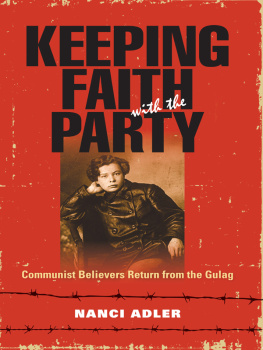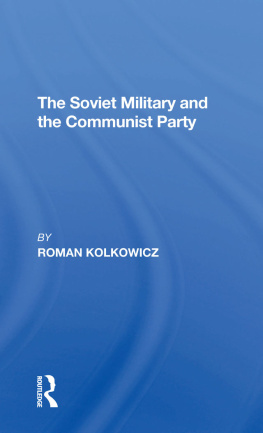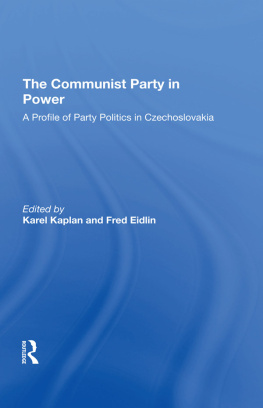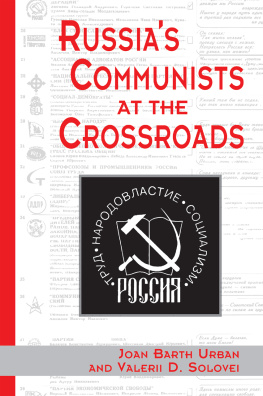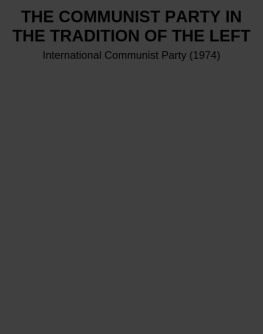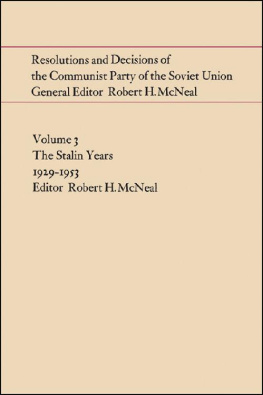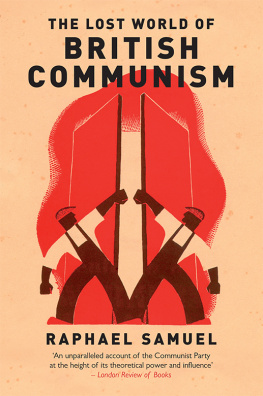ACKNOWLEDGMENTS
This work would not have been possible without the deeply personal contributions of a number of extraordinary individuals, who took the time to talk, listen, and think about a difficult, sensitive, and even painful subject. For this, I gratefully acknowledge: Gerta Chuprun, Elena Karagaeva, Marlen Korallov, Mariia Kuznetsova, Tania Langerova, Roy Medvedev, Nataliia Rykova, Zoria Serebriakova, and Evgeniia Smirnova. With equal gratitude, I acknowledge the memoirists whom I did not have the privilege to meet, but whose experiences are recorded and analyzed in this book. These Gulag victims and survivors were instrumental in shaping my perceptions. Arsenii Roginskii, a longtime friend, has been invaluable to this research. He advised me, debated with me, sharpened my conceptualization of this complex topic, and, most challengingly perhaps, invited and encouraged me to reflect upon my conclusions with critical Russian audiences. Semen Vilenskii has guided my understanding of the Gulag by generously sharing his own experiences, his wealth of knowledge, and his contacts since the day we met in 1995; I am richer for knowing him. Vladlen Loginov took on my task as if it were his own, providing advice, introductions, criticism, and perspective. My thanks also go to Nikita Petrov, ever ready to help when I needed it.
I would like to take this opportunity to acknowledge a number of institutions for supporting this project. In the first place, this research was most generously funded by an Innovative Grant from the Netherlands Scientific Council (NWO). Support was also provided by the University of Amsterdam, the department of East European Studies, and the Center for Holocaust and Genocide Studies of the Netherlands Institute for War Documentation. The archives RGASPI, RGANI, and GARF, in particular Dina Nokhotivich and Galina Gorskaia, facilitated timely access to hundreds of documents, even accommodating my tight travel schedule on inventory days when the archive was closed. The organization Memorial, especially Alena Kozlova and Irina Ostrovskaia, provided valuable contacts, dossiers, and photos. The International Institute of Social History in Amsterdam was most helpful in arranging for me to work with their Memorial archive. Finally, I am grateful to the Russian State Humanitarian University (RGGU)my home in Moscowfor graciously making my stays so comfortable.
In the course of this research, I had the privilege of being invited to present my work to several different forums of experts, who helped sharpen my observations and analyses. These venues included: the Harvard Conference on the History and Legacy of the Gulag, the Hebrew University Conference on Eyewitness Narratives, the Approaches to Stalinism conference in Moscow, and the Repressed Russian Provinces conference in Smolensk. I am grateful to have had the opportunity to lecture on this research at the HL-Senteret in Oslo, the Center for Women's Studies in Zagreb, the Netherlands Embassy in Moscow, King's College of Cambridge, the Hugo Valentin Center in Uppsala, the Forschungsstelle Osteuropa in Bremen, and Lund University. The students and colleagues who attended these events asked important questions, suggested literature I had not considered, and expanded my thinking about the meaning of my findings.
Several colleagues stayed the course of this project with me. My good friend Erik Van Ree scrupulously read and critically commented on every chapter. This book benefited considerably from his informed, insightful observations. Stephen Cohenalways there when I needed himselflessly shared his voluminous returnee archive, dialogued with me, and offered indispensable advice, support, and friendship. I would also like to acknowledge the critical remarks of Leona Toker and Alexander Etkind, who greatly improved the focus of the manuscript. Hans Blom has helped facilitate my scholarly pursuits ever since I met him. My thanks also go to Jan Lucassen and Lex Heerma van Voss for believing in this undertaking. My colleagues in Amsterdamespecially Jolande Withuis, Karel Berkhoff, Barbara Boender, Wichert ten Have, Johannes Houwink ten Cate, Selma Leydesdorff, Peter Romijn, Marjan Schwegman, Siep Stuurman, and my Veni-Vidi groupwere readily available to listen and comment, and provided valuable support throughout this project. Finally, my sincere gratitude goes to Janet Rabinowitch for her drive, enthusiasm, and expert input in shaping the manuscript. Peter Froehlich, Candace McNulty, and Marvin Keenan offered excellent editorial assistance.
Last but by no means least, I humbly express my heartfelt appreciation to my family. My father, Herbert Adler, a psychiatrist and Fellow of the American College of Psychiatrists, conscientiously read and commented on every chapter. Always thinking out of the box, his unconventional, erudite observations impelled me to broaden my horizons, and added nuance to this work. My husband, Rob, and my twins, Zo and Noah, patiently endured my frequent absences, made sure I had time to work when I was at home, visited me in Moscow, and always remained engaged in what I was doing. To them I owe the greatest debt of gratitudeI thank them for being here, and there, and everywhere for me.
CHAPTER 1
The Gulag Prisoner and the Bolshevik Soul
Oksana Lazarevna taught socioeconomics at Odessa University and was the mother of two. She was also the wife of an enemy of the people, who had been arrested and taken away. Oksana was a committed Party member, but as she watched the arrest of one after another of her cohorts, she suspected that the enemy had penetrated the Party, and it was the NKVD. One day, while Oksana was nursing her infant son, they came for her too. The NKVD agents tore the baby from her and dispatched her sons to her parents. Oksana was taken to an Odessa prison. There, the suspicions she had harbored when she was free were confirmed by what she witnessed in prison.
By the time Oksana was sent to the Gulag, she had resolved to clear the names of honest Communists. Given the content of Oksana's letters, it is unlikely that she even made it to, or survived transport to, the camps. What is likely is that she maintained her faith until the very end.
In the aftermath of Khrushchev's Secret Speech, the great wave of return and rehabilitation was followed by thousands of requests for Party reinstatement.
Religions are faith-based beliefs that provide a connection to a higher power, contingent on adherence to a world view. In a religious context, this connection is described as the soul, which refers to the immaterial essencethe spiritual principle embodied in human beings. Indeed, it is an ordinary part of daily human experience. Examples of this transcendent connectivity can be found in parenthood, religious devotion, patriotism, and belonging to a collective.
For purposes of discussion, this chapter focuses on and seeks to explain Gulag prisoner and returnee accounts that profess enduring faith in the Party and the Communist project. This faith raises issues concerning Bolshevism's similarity to religion, which included sacrificing the individual for the collective, self-reflection, conversion, confession, and purging. The idea that Communism was a secular or political religion is neither new nor fully explanatory, but it is one factor relevant to understanding the preservation of belief despite the Gulag.
RELIGION AND BOLSHEVISM
The success of religions in appropriating the human proclivity for a superordinate connection is evidenced by the prevalence and variety of competing religions throughout human history and across a wide array of cultures. Religions compete with each other and with secular political systems. Their popularity is especially informative because they often succeed in spite of contrary scientific evidence. Atheists regularly point out that people accept the claims of religion with less scrutiny than they would apply to claims regarding the material value of a purchase. Since this is common behavior, it can be inferred that religious adherents are receiving immaterial value and relying on nonobjective evidence. The immaterial value that believers receive from religion is a connection with a higher power or greater cause that provides meaning to their life.
Next page
